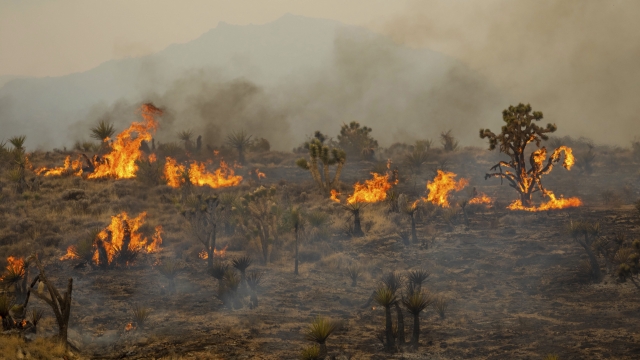Walking through West Rocky Prairie in Western Washington, about 20 miles south of the state capital of Olympia, it looks like the ground has been ravaged by wildfire.
"Come next spring though, these leaves will be lush and green. We were able to burn this area with very little burn scarring on the actual trees themselves," said Bill Kronland, the Wildlife Area Manager of the Scatter Creek Wildlife Area, where West Rocky Prairie is located.
This burnt earth is the product of a prescribed burn, in which firefighters and other state agencies plan, prepare and set fire to landscapes, all in the name of forest fire prevention.
"We know what the weather conditions are going to be during the time that we're conducting the burn, and we control the resources that are on the burn," said Mike Norris of the Washington Department of Natural Resources.
The goal of a prescribed burn is to eat up fuel on the ground – fuel being dried grass, sticks, and overgrown brush. It's what America's Indigenous peoples had been doing for centuries and is now included in more fire management plans nationwide. However, it hasn't always been so.
"Over the last a hundred years, we suppressed nearly every fire, and now we're realizing that what we had done in the past wasn't the best thing we could have been doing," said Norris.
SEE MORE: 6 killed as wind-driven wildfire rages through Maui, Hawaii
According to the U.S. Forest Service, near the turn of last century, the national wildfire strategy was to put out 100% of fires, natural or man-made, in efforts to save lives and property.
While that policy may have had good intentions, it was made without the knowledge emergency responders have today. Now, with the hotter, drier climate, the Forest Service says the excess fuel adds to the destructive power of the kinds of wild fires we see today.
Controlled burns are like a hard reset on the land — getting rid of potential dangers to make a more fire resistant landscape.
These burns, however, aren't a perfect solution. They still cause smoke, and even though they are controlled, there is a potential for them to get out of hand.
In some areas like California, insurance to cover damage from a controlled burn gone wrong can be prohibitive. That's why the state has created a $20 million insurance fund to make sure this crucial piece of firefighting strategy can be implemented more easily.
Another added benefit is that controlled burns can get rid of invasive plant species that haven't evolved to handle life with fire. That way, the native plants that are supposed to be there will begin to sprout up again soon.
"If you come back this fall and next spring, it's going to look completely different. It will be green. These trees will look beautiful. there'll be wildlife all through here. Deer will be grazing through here," said Fiona Edwards, prescribed fire planner for the Washington Department of Fish and Wildlife.
Trending stories at Scrippsnews.com




